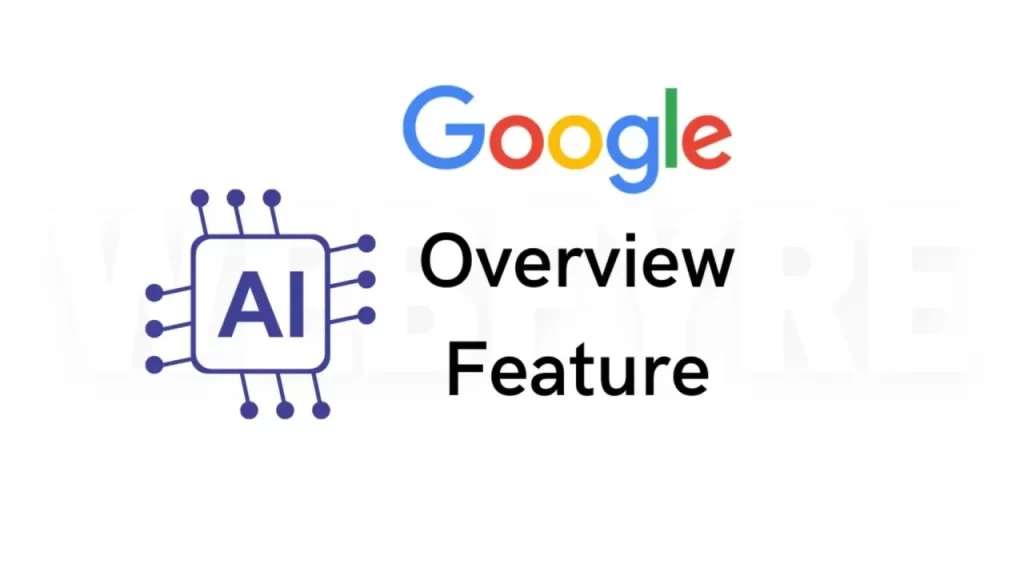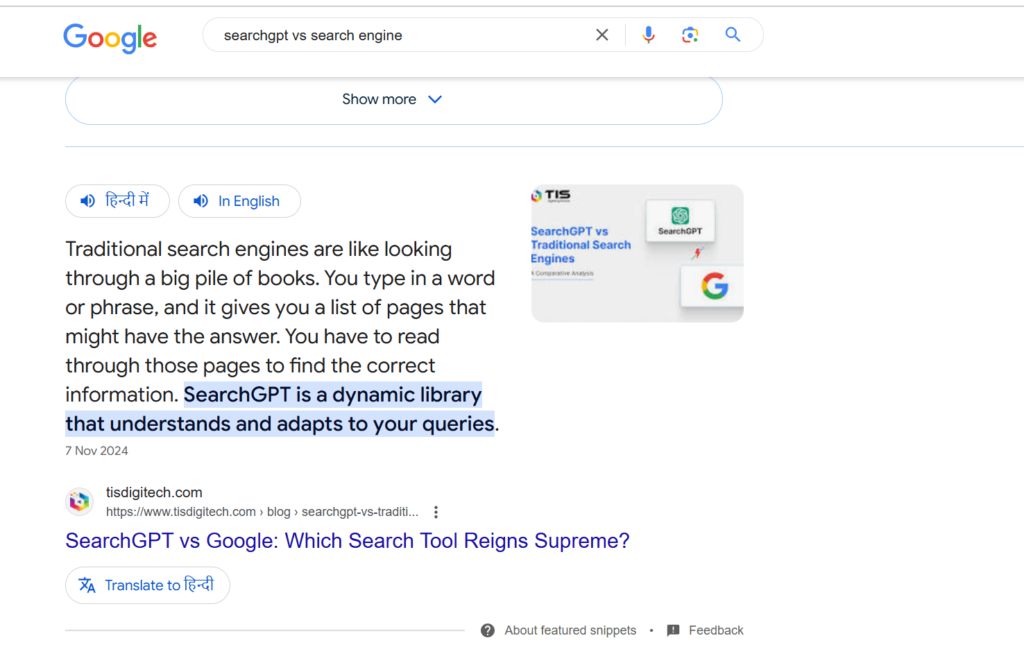
The digital landscape is constantly evolving, and Google’s search engine is no exception. One of the latest innovations, AI overviews, has revolutionized the way we search and consume information online. These concise, informative summaries appear at the top of search results, offering users quick and accurate answers to their queries. But how can you ensure your content ranks in these coveted spots? If you’re aiming to rank higher on search engines, especially in AI-driven overviews, understanding the algorithms that power search engines like Google is key.
In this comprehensive guide, we, the well-known Digital Marketing Company, will explore nine actionable tips on how to rank in AI overviews with examples. So, if you’re ready to take your content to the next level and dominate the search engine results pages, let’s start reading:

Check the list of tips/strategies you should follow to rank in AI-overview:
Google’s search algorithm has evolved significantly over the years, and with the introduction of AI and machine learning, it’s become increasingly complex. Google’s RankBrain, a machine-learning-based algorithm, is an example of how AI is shaping search engine algorithms. According to Wordstream, RankBrain accounts for about 15% of search queries, meaning that it’s crucial to understand how AI interprets search results.
Tip:
To rank well, focus on optimizing content for relevance, quality, and user intent rather than trying to “game” the system. AI-powered search engine optimization is designed to prioritize high-quality content that addresses users’ needs.
Example:
If you’re writing about “local healthcare centers,” ensure your content answers common questions like “What are the facilities the local healthcare offers?” and “How do local healthcare centers build trust? ” etc. By offering comprehensive insights, case studies, and actionable tips, your content better satisfies users’ needs, improving your ranking.
Featured snippets, also known as position zero, are the boxed results that appear at the top of some search engine results pages (SERPs). AI-driven algorithms, particularly those powered by natural language processing (NLP), have made these snippets more common. Google’s AI, through NLP, is able to identify concise, authoritative answers and place them at the top of search results.
Tip:
Aim to create content that directly answers common questions related to your topic in a clear and concise format. Use bullet points, numbered lists, or short paragraphs to increase the likelihood of your content being featured as a featured snippet.
Example:
Suppose you’re writing a blog post about “SearchGPT vs Traditional Search Engines: A Comparative Analysis.” To increase the chances of your content being featured in a featured snippet, structure it to answer common concepts or questions like “Pros and cons of SearchGPT and Google” using bullet points or numbered lists.

This structure, combined with relevant keywords, would increase your chances of being selected for a featured snippet. A page with structured data has a 30% higher chance of appearing in rich snippets compared to pages without it
Structured data is a way of providing additional information about your web page in a format that AI algorithms can easily understand. By using schema markup, you can help search engines like Google interpret your content more accurately, improving the chances of ranking in rich snippets, carousels, and knowledge panels.
Tip:
Implement schema markup for articles, blogs, FAQs, and other content types to provide Google’s AI with structured data. This improves search engine understanding of your content’s context, leading to enhanced visibility and potentially higher rankings in search results.
Example:
Let’s say you run a blog about “AI in healthcare” and write an article discussing the benefits of AI in diagnosing diseases. To increase your chances of ranking in rich snippets or appearing in a knowledge panel, you can implement schema markup to provide search engines with structured data that enhances their understanding of your content.
For example, using FAQ schema markup, you could format questions like:
You would use structured data to code the questions and answers, which might look like this:
{
“@context”: “https://schema.org”,
“@type”: “FAQPage”,
“mainEntity”: [{
“@type”: “Question”,
“name”: “What are the benefits of AI in healthcare?”,
“acceptedAnswer”: {
“@type”: “Answer”,
“text”: “AI enhances diagnostic accuracy, reduces human error, and enables personalized treatments.”
}
}]
}

By adding schema markup to your article, you help Google’s AI algorithms understand the content more effectively. This structured data could lead to your page being featured in rich snippets, the knowledge panel, or even the carousel for related search queries. As a result, your blog becomes more visible in search results, driving more organic traffic and increasing your chances of higher rankings.
One of the essential factors AI looks for in content is its ability to provide comprehensive, in-depth answers. Google’s BERT (Bidirectional Encoder Representations from Transformers) algorithm and other AI-powered systems prioritize content that provides detailed, well-researched, and original insights. Studies show that long-form content (3,000+ words) ranks better on Google, with 96% of content on the first page of search results being over 1,000 words.
Tip:
Focus on creating comprehensive, long-form content with engaging facts that thoroughly explore your topic. Provide in-depth explanations, real-world case studies, relevant examples, and actionable insights that offer real value to your audience. This not only boosts engagement but also signals to search engines that your content is authoritative and informative.
Example:
If you’re writing a blog on ‘digitalization in electronics’, a 2,000+ word post that explains everything from digitalization’s role in customer personalization to inventory management and fraud detection will likely rank better than shorter, superficial content.
With 59.45%% of global searches now coming from mobile devices, Google’s AI algorithms take mobile optimization into account when ranking websites. Mobile-first indexing means that Google predominantly uses the mobile version of your site for ranking and indexing.
Tip:
Make sure your website is mobile-friendly by having a responsive design, fast loading times, and a user-friendly layout. This ensures that visitors, as well as Google’s AI, can easily navigate your site from any device.
Example:
Suppose you run an e-commerce store selling gadgets. After testing, you find that your mobile site loads slowly, and images don’t adjust properly to smaller screens. By switching to a responsive design, compressing images for faster loading, and streamlining navigation, you improve both user experience and mobile indexing, boosting your chances of ranking higher in Google’s mobile-first search results.
AI algorithms are increasingly focused on user experience (UX), and Google’s core web vitals (LCP, FID, CLS) are good indicators of how well your site performs in this regard. These metrics assess the loading speed, interactivity, and visual stability of a page. Pages that offer a positive user experience are more likely to rank higher.
Tip:
Improve the user experience on your site by focusing on fast load times, easy navigation, and mobile optimization. Using AI-driven design tools can help enhance visual appeal and performance.
With advancements in AI, particularly in natural language processing (NLP), Google’s algorithms now prioritize content that is well-structured, written in natural language, and easy for machines to understand. NLP allows Google to better understand synonyms, context, and user intent, making it important to write content that flows naturally and answers specific user queries.
Tip:
Write your content as if you’re talking directly to your audience. Avoid overstuffing keywords and focus on delivering a natural, engaging experience. Use conversational language and consider the intent behind the queries.
Example:
If you’re creating content about “AI in robotics,” instead of focusing solely on the keyword “AI in robotics,” use variations like “How AI enhances robotics,” “Benefits of AI in robotics,” and “Applications of AI in robotic systems.” This will help the AI algorithms understand your content better.
Local search optimization is critical for businesses targeting specific geographic regions. With AI-powered algorithms like Google’s RankBrain and Pigeon, local searches have become more precise. Google uses AI to understand local intent, matching users with relevant results based on their location.
Tip:
For local businesses, incorporate location-specific keywords throughout your content, create and optimize your Google Business Profile listing, and focus on acquiring backlinks from local websites. These strategies improve local SEO and help your business rank higher in geographic searches.
Example:
A restaurant offering screen ordering systems can use keywords like “digital restaurant in [city]” or “ digital screen ordering experience in [location]” to capture local search traffic.
Google’s AI continuously updates and refines its algorithms, so keeping track of how your content performs is crucial. Using analytics tools can help you assess traffic trends, user behavior, and keyword performance. With this data, you can refine your content and SEO strategies for better rankings. Websites that consistently monitor and update content have up to a 50% increase in organic traffic over time.
Tip:
Regularly review your website’s performance data and adjust your strategies based on what works and what doesn’t. Analytics tools can help you monitor key metrics and suggest areas for improvement.
Example:
If your content about “Impact of Internet on education” is receiving high traffic from specific keywords but low engagement, use insights to refine your page’s structure, tone, or content to increase user retention.
Ranking in AI-driven overviews requires a combination of technical SEO, high-quality content, and a deep understanding of how AI algorithms interpret and rank pages. By following these tips, you can improve your chances of ranking higher in search results, whether you’re writing about AI technology, healthcare, or any other topic. Keep experimenting, monitoring your progress, and adjusting your approach as AI continues to shape the future of search engines. The key to success lies in leveraging AI to improve both your content and your website’s user experience.
If you have any questions or want to rank your website at the top of the Google AI overview in this competitive world, we are your true friend. Connect us to discuss your requirements.